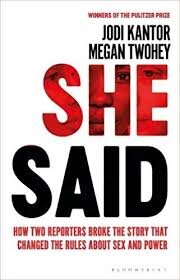She Said...Patient Said?
This past Friday I picked up a copy of the recently released book "She Said" from my local library. I finished reading it yesterday, Monday, over lunch. Yep, it was that good. She Said was written by New York Times investigative reporters Jodi Kantor and Megan Twohey and it shares the story of their explosive investigative reporting into Harvey Weinstein's decades-long sexual abuse of his employees and business associates. Their October 2017 New York Times article brought down Weinstein and his company, launched the #MeToo Movement, and earned the reporters a Pulitzer Prize.
Other than being a great read on an important topic, I am bringing this book to the attention of Sorry Works! readers because it details how Weinstein used non-disclosure agreements -- or NDAs or gag orders -- to silence his victims and continue his crime spree. In fact, the authors dedicated an entire chapter to the topic ("How to Silence a Victim," Chapter 3). Kantor and Twohey describe in detail the terms of some of these gag orders, including the victims could not speak about their employment with Weinstein's company, could not share details of their accusations with family or friends, could not be truthful with their accountants about the source of settlement dollars, and would agree to conceal the truth if the media snooped around.
Question: Why would the medical community want to be even remotely associated with such filth? Such evil?
Harvey Weinstein -- and predators like him -- intentionally hurt people. Conversely, I have never met a doctor or nurse who wanted to malpractice another human being. Even incompetent docs tried to help others. Yet, too often in our country, patients and families are forced to sign gag orders or NDAs to receive money from medical malpractice complaints. The defense lawyers will claim families don't want others knowing they received money, which can be true sometimes but you don't need gag orders to silence these folks (they self-silence). Conversely, many PI lawyers will claim gag orders are a necessary evil to reach fair monetary settlements. Interestingly, in the She Said book, famed lawyer Gloria Allred, who has represented many abuse survivors, was depicted as an attorney who believes sexual abuse defendants will never settle cases without NDAs. The She Said authors reported there are some legislative bodies here in the States and elsewhere that are contemplating bans on gag orders for sexual abuse cases (much to the consternation of Allred and other lawyers). The medical community shouldn't need legislative mandates to do away with gag orders, especially with the disclosure movement taking root.
Back in 2017 (around the time the Weinstein story was breaking), Sorry Works! released a comprehensive report on gag orders entitled "Don't Gag Me" which included reform ideas for settlement documents. While conducting the research for this report I found it very interesting that most healthcare administrators had not even thought about the language in their settlement documents; many had literally not looked at these documents in years, if ever. Moreover, many lawyers told me NDAs are simply "a check box" on the way to settlements. Furthermore, many healthcare professionals I interviewed for the report expressed the concern that NDAs were inhibiting learning & patient safety efforts between healthcare organizations.
Here is the link to our "Don't Gag Me" Report, and immediately below are the summary of recommendations from that report:
1. Settlements with no confidentiality clauses, and case details can be openly shared to improve patient safety (without names or monetary figures).
2. Development of “advocacy clauses” in settlement documents to educate consumers and clinicians about the ways their stories can be used to improve patient safety.
3. Crafting HIPAA waivers so a hospital, nursing home, or clinician is not gagged in responding to a media story.
4. Creation of a voluntary nationwide database of closed claims to further increase learning from medical errors.
At its core, Sorry Works! is an advocacy group (and we also do a lot of training on disclosure and apology). So it is fitting that we take this opportunity to advocate (or re-advocate) for healthcare administrators along with their lawyers and insurers to revisit their settlement documents. How can we disclose and apologize for mistakes, and then in writing tell people to shut up or we'll claw back their settlement dollars?
Sincerely,
- Doug
Doug Wojcieszak, Founder and President
Sorry Works!
618-559-8168 (direct dial)
doug@sorryworks.net


